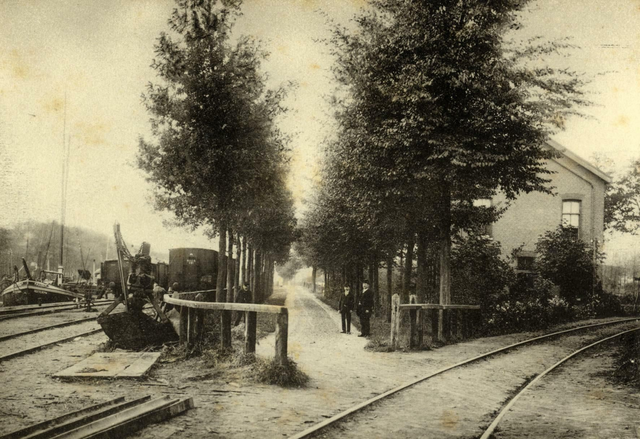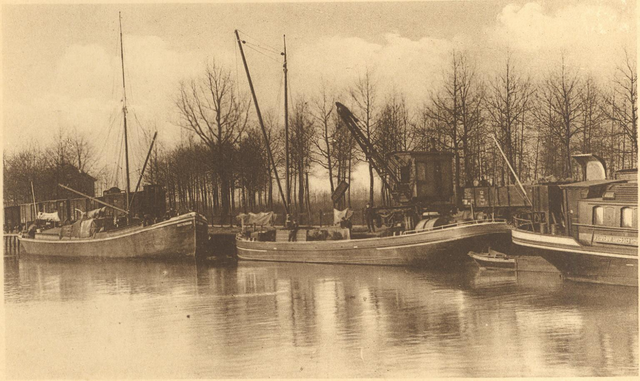The Noord-Brabantsch-Duitsche Spoorweg-Maatschappij (NBDS) competed with the ‘Staatsspoorwegen (SS)’. To avoid goods-traffic to Germany on the SS-tracks, the NBDS built its own railway port in Veghel in 1881. It was built on the Rijksweg next to the Zuid-Willems Canal. On this spot the ongoingv railway from the Duits Lijntje turns off to the railway port. Goods from Rotterdam could be transferred directly from the water onto the NBDS carriages. This method became so successful that the NBDS created its own steam ship service.
Trans-shipment from ship to train and tram
In 1885 the railway port was extended with a loading- and unloading platform and a siding along the Veghel port. A station building appeared on the Rijksweg, which was later expanded with a goods shed and a corn silo. Inattentive behaviour of the stations’ staff and hurriedly shunting of the trains trains in the railway port caused precarious situations with passers-by. The railway crossing near the railway port was equipped wit swinging gates by the NBDS in 1896 after a lawsuit against the railway track supervisor. In 1915 a unique trans-shipment situation arose along the railway port on the Noordkade for the Coöperatieve Handels Vereniging (CHV) from the Noordbrabantsche Christelijke Boerenbond (NCB). Goods could be transferred between cargo ships as well as train- and tram-carriages.
Heated atmosphere
Although a tank engine was purchased, there was such a rush of business in the railway port that there was a regular shortage of means of transport. Sometimes dozens of ships were waiting. Especially the trade in potatoes, straw, ore and German brown coal was enormous. The activities offered lots of jobs to numerous casual workers and the railway yard was in business 24/7 (twenty-four – seven). Every now and then there was a heated atmosphere which was characterized by arguments, fights and industrial accidents, sometimes even fatal. Several times bodies were taken from the water. In 1907 Sunday rest was finally introduced, this was a big relief for the Catholic Church. In 1919 the big rush was over. Staatsspoorwegen (SS), who owned the Duits Lijntje by then, closed down the steamboat services.
(Text and images: Heemkundekring Vehchele)
-

-

-
Go to other translations
Do you want to read more about the Duits Lijntje? Go (back) to the translations of the other locations on the railway track in Meierijstad.
Go to other translations
